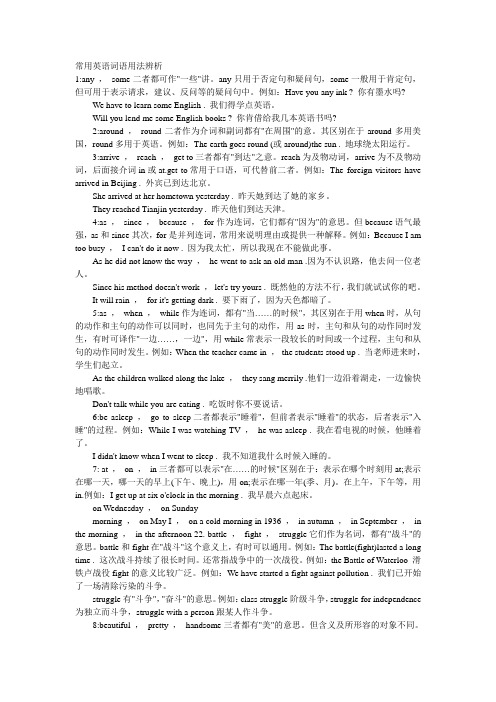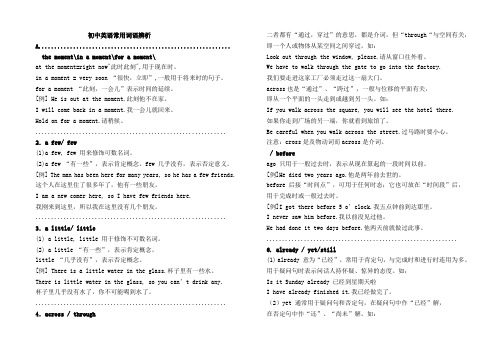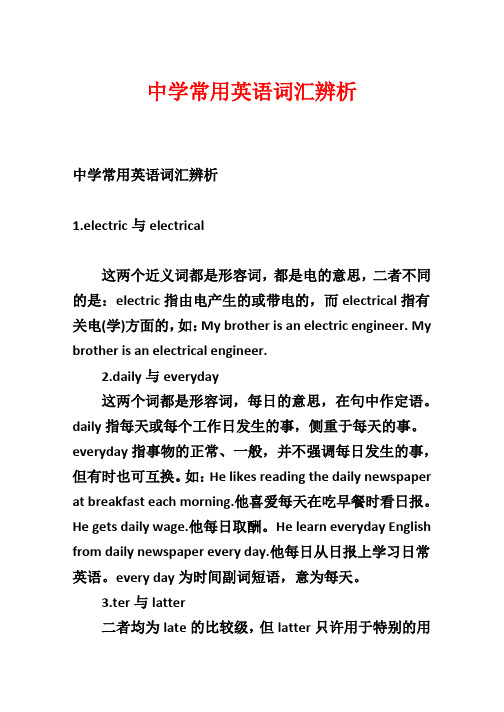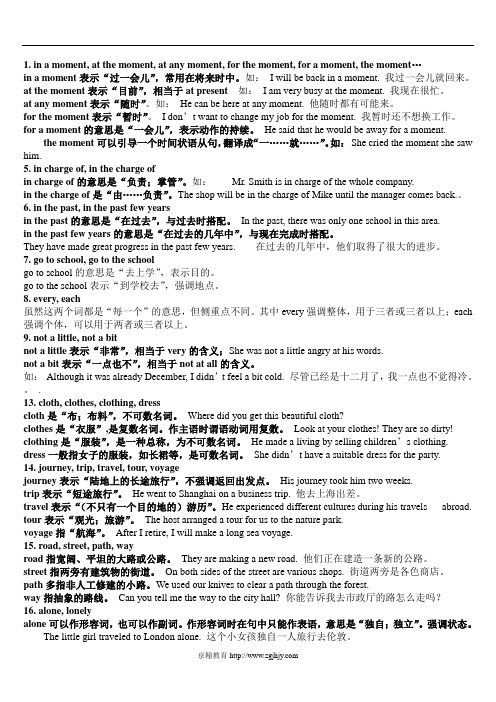30个常用英语短语辨析
初中英语词汇辨析30组

There are some new books on the desk. 桌子上有一些新书。 Would you like some water? (表征求、询问) 您来点儿水吗?
Are there any new books on desk? 桌子上有新书吗?
There isn’t any milk in the glass. 杯子里没有牛奶了。
词汇
用法
long before 很早以前;在……以前很久
before long 不久以后
8.alone / lonely
例句
He retired long before the war. 他在战争之前早就退休了。 Long before morning, all was done again. 天还没亮,一切又重新开始。 It won't be long before you regret what you have done. 过不了多久,你就会后悔你做的事。 Before long, we were deep in conversation. 我们很快就进入深谈。 I'll be seeing you before long. 不久,我就会见到你。 We'll see why before long. 我们不久后将看到为什么。
When did you get home / there / here?
12.agree with / agree on(upon) / agree to
词汇 agree with agree on (agree upon)
agree to
用法
例句
agree with sb. agree with sth.
英语词义辨析100组

英语词义辨析100组动词1. abandon desert discard quitabandon: 放弃,丢弃,抛弃。
指因为外界的压力或影响完全放弃,因迫不得已而放弃,如: abandon obligation 放弃任务。
desert: 抛弃,舍弃,指某人或某物在困境中“被抛弃”。
如: desert the baby after giving birth 生下婴儿后将其抛弃。
discard: 丢弃,抛弃(老朋友或旧物)。
如:discard one’s old friends 抛弃老朋友。
quit: 离开,退出,突然放弃。
指主动放弃或离开。
如: quit one’s job 辞职。
2. abolish cancel remove eliminateabolish: 废除,强调对法律或旧习惯的废除。
如: abolish slavery 废除奴隶制。
cancel: 取消,强调对原定的会议、计划、安排等取消。
如: cancel the meeting 取消会议。
remove: 出去,撤去。
强调位置的移动或从远处消失。
如: remove the stain from clothes 清除衣服上的污渍。
eliminate: 除去,剔除,淘汰。
强调使彻底消失。
如: eliminate sb. From competition 把某人淘汰出局,eliminate poverty 消除贫困3. abuse curse condemn criticizeabuse: 谩骂,辱骂;滥用,虐待。
指出口恶言骂人。
curse: 诅咒,咒骂。
表示愤怒或嫉恨。
condemn: 谴责,强调由于不良行为或过失而受到强烈谴责。
用于正式、严肃的场合。
criticize: 批评某人,强调指出某人的错误或不足之处。
4. accelerate speed hasten quickenaccelerate: 加速,既可指使物体加快速度运动,也可指使事情进程加快。
初中英语重点短语辨析

初中英语重点短语辨析1. be made of / be made fromⅠ. be made of “由……制成/造”成品看得出原料。
如:The desk is made of wood. 这张桌子是木头制成的。
Ⅱ. be made from “由……制造/成”成品看不出原料。
如;Paper is made from rags.纸是由破布做的。
(已看不出原料)2. be pleased with/ at/ toⅠ. be pleased with “对……人/物,感到满意”介词with后接人或物。
如:① Both Mark and her mother were pleased with the girl. 马克和他妈妈都有喜欢这个女孩。
② I wasn’t very pleased with / at my exam results. 我对自己的考试成绩不太满意。
Ⅱ. be pleased at “对……某事/物,感到满意”。
介词at 常与事物搭配使用。
He was very pleased at the news.他对这个消息感到很满意。
Ⅲ. be pleased to “乐意……;因……而高兴”。
to 不是介词,而是小品词。
后接动词原形。
如:① I shall be pleased to go. 我将乐意去。
② We are quite pleased to be working in this country. 能在这个国家工作,我们是十分高兴的。
3. be sure of/ be sure to do/ be sure thatⅠ.be sure of “确信对……有把握”后接名词、代词或动词-ing 形式,表对客观事物有肯定的认识和判断,主语必须是人。
如:① As David joined our team, we are sure of winning the game this time.由于David参加了我们的球队,我们这次有把握取胜。
常用英语词语用法辨析

常用英语词语用法辨析1:any ,some二者都可作"一些"讲。
any只用于否定句和疑问句,some一般用于肯定句,但可用于表示请求,建议、反问等的疑问句中。
例如:Have you any ink ? 你有墨水吗?We have to learn some English . 我们得学点英语。
Will you lend me some English books ? 你肯借给我几本英语书吗?2:around ,round二者作为介词和副词都有"在周围"的意。
其区别在于around多用美国,round多用于英语。
例如:The earth goes round (或around)the sun . 地球绕太阳运行。
3:arrive ,reach ,get to三者都有"到达"之意。
reach为及物动词,arrive为不及物动词,后面接介词in或at.get to常用于口语,可代替前二者。
例如:The foreign visitors have arrived in Beijing . 外宾已到达北京。
She arrived at her hometown yesterday . 昨天她到达了她的家乡。
They reached Tianjin yesterday . 昨天他们到达天津。
4:as ,since ,because ,for作为连词,它们都有"因为"的意思。
但because语气最强,as和since其次,for是并列连词,常用来说明理由或提供一种解释。
例如:Because I am too busy ,I can't do it now . 因为我太忙,所以我现在不能做此事。
As he did not know the way ,he went to ask an old man .因为不认识路,他去问一位老人。
初中英语常用词语辨析大全

初中英语常用词语辨析A.............................................................the moment\in a moment\for a moment\at the moment=right now"此时此刻",用于现在时。
in a moment = very soon “很快,立即”,一般用于将来时的句子。
for a moment “此刻,一会儿”表示时间的延续。
[例] He is out at the moment.此刻他不在家。
I will come back in a moment.我一会儿就回来。
Hold on for a moment.请稍候。
............................................................. 2.a few/ few(1)a few, few 用来修饰可数名词。
(2)a few “有一些”,表示肯定概念,few 几乎没有,表示否定意义。
[例] The man has been here for many years, so he has a few friends. 这个人在这里住了很多年了,他有一些朋友。
I am a new comer here, so I have few friends here.我刚来到这里,所以我在这里没有几个朋友。
............................................................. 3.a little/ little(1) a little, little 用于修饰不可数名词。
(2) a little “有一些”,表示肯定概念。
little “几乎没有”,表示否定概念。
[例] There is a little water in the glass.杯子里有一些水。
高中常用英语词汇辨析

中学常用英语词汇辨析中学常用英语词汇辨析1.electric与electrical这两个近义词都是形容词,都是电的意思,二者不同的是:electric指由电产生的或带电的,而electrical指有关电(学)方面的,如:My brother is an electric engineer. My brother is an electrical engineer.2.daily与everyday这两个词都是形容词,每日的意思,在句中作定语。
daily指每天或每个工作日发生的事,侧重于每天的事。
everyday指事物的正常、一般,并不强调每日发生的事,但有时也可互换。
如:He likes reading the daily newspaper at breakfast each morning.他喜爱每天在吃早餐时看日报。
He gets daily wage.他每日取酬。
He learn everyday English from daily newspaper every day.他每日从日报上学习日常英语。
every day为时间副词短语,意为每天。
3.ter与latter二者均为late的比较级,但latter只许用于特别的用法,且不与than连用。
later作形容词或副词时,意为较迟的(地),较后的(地),如:in ones later life在晚年。
He came later than usual.他比平常晚来一点。
latter作形容词时,通常用于名词前,意为后者的,末尾的,如:in the latter part of a speech演说的后半段,the latter half of the year 下半年。
latter还可用作代词,the latter与the former是一组反义词组。
4.pick, pick out, select与choose这几个词都表示选择选择。
pick是口头用语,指无需细致考虑或鉴别就能作出的选择。
初中英语常见词汇辨析

初中英语常见词汇辨析英语近义词辨析1.辨析:such和so:二者都表示程度,“如此;这样”,其区别为:注意:“such+a/an +adj+可数名词单数形式”可与“so+adj+a/an+可数名词单数形式”转换。
She is such a kind girl.=She is so kind a girl.2.each和every注意:each不能与almost,nearly及not搭配使用,而every可以。
Almost every window was broken.Not every student went on holiday.Each不能用于否定句,在否定句中应用none。
None of the books are mine.3.alone与lonelyShe was alone in the dark room.她独自一人呆在那间黑暗的屋子里。
He lives alone but he doesn't feel lonely.他独自生活,但并不感到孤独。
It's a lonely beach.那是一个人迹罕至的海滩。
4.stop doing sth与stop to do sth.One of +可数名词复数:……之一,做主语时,谓语动词要用单三形式。
12/ 1初中英语常见词汇辨析English is one of my favorite subjects.One of my friends knows you.5.few,a few与little,a littleThere are few eggs on the plate,so I must buy some.盘子里没几个鸡蛋了,所以我必须买一些There are a few eggs on the plate,so I needn't buy any at once.There's little milk in the glass.杯子里没多少牛奶了。
英语重点词、词组、短语辨析

1. in a moment, at the moment, at any moment, for the moment, for a moment, the moment…in a moment表示“过一会儿”,常用在将来时中。
如:I will be back in a moment. 我过一会儿就回来。
at the moment表示“目前”,相当于at present如:I am very busy at the moment. 我现在很忙。
at any moment表示“随时”。
如:He can be here at any moment. 他随时都有可能来。
for the moment表示“暂时”。
I don’t want to change my job for the moment. 我暂时还不想换工作。
for a moment的意思是“一会儿”,表示动作的持续。
He said that he would be away for a moment.the moment可以引导一个时间状语从句,翻译成“一……就……”。
如:She cried the moment she saw him.5. in charge of, in the charge ofin charge of的意思是“负责;掌管”。
如:Mr. Smith is in charge of the whole company.in the charge of是“由……负责”。
The shop will be in the charge of Mike until the manager comes back.。
6. in the past, in the past few yearsin the past的意思是“在过去”,与过去时搭配。
In the past, there was only one school in this area.in the past few years的意思是“在过去的几年中”,与现在完成时搭配。
- 1、下载文档前请自行甄别文档内容的完整性,平台不提供额外的编辑、内容补充、找答案等附加服务。
- 2、"仅部分预览"的文档,不可在线预览部分如存在完整性等问题,可反馈申请退款(可完整预览的文档不适用该条件!)。
- 3、如文档侵犯您的权益,请联系客服反馈,我们会尽快为您处理(人工客服工作时间:9:00-18:30)。
1. burn down / burn out / burn up burn down (火势)减弱,(被)焚毁;burn out烧尽,熄灭;burn up 被烧掉(毁),烧得更旺。
2. how often / how long / how far / how soon how often有"多久一次"的意思,是对做某事的频率提问。
对how often的回答一般是:twice a year/three times a week。
how long表示"时间多久或物体多长",表示时间时侧重指"一段时间"。
对how long的回答一般是时间段,如for three days。
how far是提问"路程有多远",询问距离",主要用来对表示将来的,还可以表示程度。
how soon表示"多久之后的一段时间提问。
对how soon的回答一般是:in + 时间段,如in two days/in five years。
3. call at / call back / call for / call in / call on / call upcall at (a place)访问(某地);call back回电话; call for (公开)要求,需要; call in要求退回,召来;call on邀请,请求; call up使回忆起,使想起。
4. come about / come across / come off / come out / come true /come upcome about发生;come across(偶然)遇见;come off能被去掉(或除去);come out出版,发行; come true变为现实,实现;come up长出地面,升起。
5. cut down / cut off / cut through / cut up / cut in cut down砍倒,削减;cut off打断,中断(供给);cut through开辟(出路或通道);cut up(严重地)割伤,打伤,切碎;cut in插嘴。
6. break out / break down / break away from / break into / break off / break through / break up break out爆发;break down出故障,坏掉;break away from突然挣脱,逃脱;break into强行闯入;break off中断,断开;break through克服,战胜;break up拆开,打散。
7. bring in / bring up / bring about bring in引入,赚得;bring up抚养,养育;bring about导致,引起。
8. run out / go out / give out / leave out run out用完,耗尽;go out外出交际,送出,发出;give out用完,耗尽,停止运转; leave out省去,遗漏,不包括。
9. get along with / get back / get close to / get down to / get in touch with / get off / get through get along with与……相处;get back回去,返回;get close to接近;get down to开始做…… get in touch with与……联系(接触);get off脱下;get through顺利通过(考试等),拨通(电话)。
10. go away / go against / go ahead / go bad / go off / go on doing/ go onwith / go up go away走开,离家外出,消失;go against违反,与……不符(或相反);go ahead走在前面,先走;go bad (食物)变坏,坏掉;go off离开(尤指去做某事); go on doing sth.继续干某事,不停地干某事; go on with sth。
(尤指停顿或中断之后)继续做某事; go up (价格,温度等)上涨,上升。
11.keep back / keep fit / keep in touch with / keep on / keep up with / keep out; keep back保留; keep fit保持健康; keep in touch with 与……保持联系keep on继续;keep up with跟上,并驾齐驱;keep out不进入,留在外面。
12. turn down / turn... into... / turn off / turn out / turn up / turn over turn down关小,把……调低;turn ... into ...把……变成…… turn off关掉(水、电、收音机等);turn out证明是,结果是;turn up到达,偶然出现;turn over转动,翻身。
13. take after / take apart / take away / take down / take on / take off /take up / take over / take in 动词take的相关短语也是高频短语,常见的有:take after (外貌或行为)像(父或母);take a part拆卸,拆开(机器等);take away解除,消除(感情、痛苦等);take down拆掉,拆卸,误认为;take on呈现,雇佣,承担(责任);take off取消,脱下(衣帽等);take up占用(时间),占据(空间),开始从事;take over接管,接手;take in留宿,收留,吸入。
14. die of / die from / die down / die out die of死于(内在原因,如疾病等);die from死于(外在原因,如事故等);die down逐渐变弱,逐渐平息;die out灭绝。
15.give away / give off / give out / give in to / give back give away捐赠,分发,泄露;give off发出,放出(气味、热、光等);give out发出,用完;give in to向……投降,让步;give back使恢复,归还。
16. hold on / hold out / hold back / hold up hold on(电话用语)等一下,别挂断;hold out坚持,抵抗,提供机会;hold back隐瞒;hold up推迟,耽搁。
17. look into / look through / look on / look out / look down on look into调查;look through快速查看;look on旁观;look out当心;look down on轻视,瞧不起。
18.make up/make out/make no sense/make up for/make the most of make up构成,化妆;make out理解,明白(事理);make no sense没有意义;make up for弥补; make the most of充分利用。
19.pay back / pay off / pay for pay back(向某人)还钱;pay off付清;pay for为……付费。
20.pick up / pick out pick up拿起,(为某人)收拾,(开车)接人,接收(信号、声音、图像等),(偶然)学会;pick out精心挑选,辨别出。
【易混短语辨析】1. since then / from then on / ever since / ever before since then意为"从那时以来",通常与动词的现在完成时连用,指从过去某一时刻起到现在为止的一段时间。
from then on意为"从那时起",通常与动词的一般过去时连用,指过去某一时刻之后的时间。
ever since 意为"自……以后,从……起",其中since是副词,意为"从那以后",通常与延续性动词的完成时态连用。
ever before的意思是"在以往任何时候",常出现在than后面,其中before是副词,有时可以省略,ever用以加强语气。
2. on board /on the board /on the boards on board泛指"在船上",还可指"在飞机(火车,公共汽车等)上"。
这个习语也可接船名或船的类型(如:on board the Dongfeng在东风号上;on board a liner在邮轮上)。
on the board除可表示"在(具体的)这艘或那艘船上"外,还可表示"在会上讨论"。
on the boards中的boards是"舞台"的意思,其原义是"在舞台上",现常引申为"做演员"或"演出",常用在连系动词be后作表语。
3. too much/much too much too意为"太……",相当于very。
too much意为"太多",可修饰不可数名词;若修饰可数名词,则用too many。
4. on the air/in the air/in the open air on the air意为"正在播送(电视、广播)";in the air意为"在传播中,可感觉到的,流行";in the open air意为"在户外"。
5. at a distance/in the distance at a distance是"从远处"的意思,表示一定的距离、近距离或可以说明具体的距离,其不定冠词a有时可以省略或是改为some。
in the distance表示在"在远处",强调距离之远。
